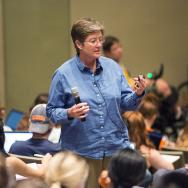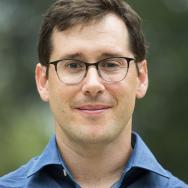When Nels Elde, PhD’05, arrived at the University of Chicago in 1998, he found himself in an exciting research environment—one that combined an “incredible tradition of academics” with an amazing group of collaborators in his fellow graduate students.
But it wasn’t just UChicago’s reputation as a research powerhouse that bolstered Elde’s scientific career. In the lab of his graduate advisor, Prof. Aaron Turkewitz, he also found the space to have fun.
“In Aaron’s lab, it wasn’t just great science; it was also creative science,” said Elde, now an evolutionary biologist at the University of Utah, where he is an associate professor of human genetics. “He encouraged us to follow our curiosity and have fun. Aaron is also a skilled artist and potter. It was a really inspirational, foundational lesson about mixing art and science that taught me how to center creativity in my work.”
As a PhD student in the Department of Molecular Genetics and Cell Biology at UChicago, Elde researched the evolution of cellular mechanisms across different species. Now, 15 years later, his innovative approach to research has landed him a MacArthur Fellowship, which provides a $625,000, no-strings-attached award to individuals who have shown extraordinary originality and dedication in their creative pursuits. He is one of 21 people honored in this year’s class, which also includes former UChicago sociologist Forrest Stuart.
Elde’s dissertation research at the University was focused on understanding how distantly related species evolved unique solutions to solve similar cellular problems, looking far out on the branches of the evolutionary tree to combine cell biology with evolutionary genetics.
“Virtually all mainstream cell biologists had previously assumed that the mechanisms cells are using to function are so complicated that they could have evolved only once, and then they must have been conserved in all species after that,” said Turkewitz, a professor of molecular genetics and cell biology at UChicago. “But Nels realized that there are times when, completely independently, cells figured out how to solve some problem—not conserving the same mechanism, but solving the same problem twice in different ways.
“So now instead of asking, ‘How did cells solve this particular problem?’, you could ask, ‘What is the principle that cells are using to solve this problem? What do these solutions have in common, and how do they differ?’”
Elde found that UChicago provided the perfect environment for exploring these big-picture questions about small-scale cells. Working with Turkewitz, he studied a cousin of the paramecium known as a Tetrahymena—a “pond critter” with whom humans share a common ancestor that existed around a billion years ago. “I discovered that some of the shared biology is actually quite different even though it looks almost identical,” Elde said, “which got me wondering how species start to change after they diverge from a common ancestor.”
With the help of UChicago scientists like Profs. Manyuan Long and Anna Di Rienzo, Elde learned “to think across the boundaries of cell biology and evolutionary biology”—a turning point in his academic career.
Elde now studies host-pathogen interactions and ways in which organisms evolve to better attack others or defend themselves. He is particularly interested in understanding how evolution drives rapid adaptations in hosts and pathogens. Human interactions with those microbes can lead to changes in a matter of years—a “blink of an eye, in evolutionary terms.” In the lab, Elde can set up experiments to see viruses adapt in real time over the course of weeks or months.
Elde is excited about what the award means for his work, both as a geneticist and as a science communicator. As the co-host of This Week in Evolution—a podcast about evolutionary biology—he hopes to continue telling the stories of scientists whose work has yet to reach the public, and explain how their experiences shape their research.
Funding from the MacArthur Fellowship will also challenge Elde to go “off-roading a little bit” in his scientific perspective—to try and answer “those ‘out there’ kinds of questions.” One line of research he hopes to pursue involves the evolution of the immune system in aquatic species. Since some of our oldest ancestors looked more like fish than humans, discoveries in those species could help us better understand the origins of our own immune systems.
“The wildest ideas you sometimes just don’t explore, because you think they’re probably not going to work,” Elde said, “but this is an opportunity to dust those ideas off, shake them up, and see if there’s something to them.”
Elde is now among the more than 50 people associated with UChicago to have won a MacArthur Fellowship. He still credits the “breathtaking” intellectual energy he found at the University for helping him first blossom as a scientist.
“It’s never stopped influencing my research,” he said. “The faculty and students there were more than just advisors—they’re lifelong friends and now my colleagues. UChicago has a history of major advances in evolutionary genetics, and it also continues to build into the future.
“I wasn’t just trained in research techniques while I was there; I was trained in how to pursue a scientific life.”

